The English question: Young are less proud to be English
- Published
Being English 'is about fish and chips'
Young people are far less likely to feel proud to be English than older generations, a major survey for the BBC reveals.
Eight out of 10 people in England identify strongly as English but pride varies by age.
YouGov surveyed 20,081 people and found 72% of over-65s are proud to be English, compared with 45% of 18-24s.
Half of those surveyed think England was better in the past, with one in six believing its best days lie ahead.
Humour, tradition and good manners are the characteristics most associated with being English.
The poll was conducted for the BBC's The English Question project and is the largest and most comprehensive of its kind. Respondents were asked to complete a detailed online questionnaire on identity and belonging.
If the postcode search does not launch click here, external.
The results of the survey highlighted that:
Parts of Lincolnshire and the Midlands identity particularly strongly as English, with more than nine out of 10 respondents saying they felt very strongly or fairly strongly English
London, Oxford and Cambridge are at the opposite end, with between 32% and 45% of respondents saying they did not identify strongly as English
English pride is felt by about two thirds of people in coastal and former industrial towns but less than half of people in major cities like Liverpool and Manchester
In London boroughs such as Hackney and Lambeth, pride in being English is felt only 37% and 38% of people respectively
The further from London someone lives, the more they identify with a particular part of England
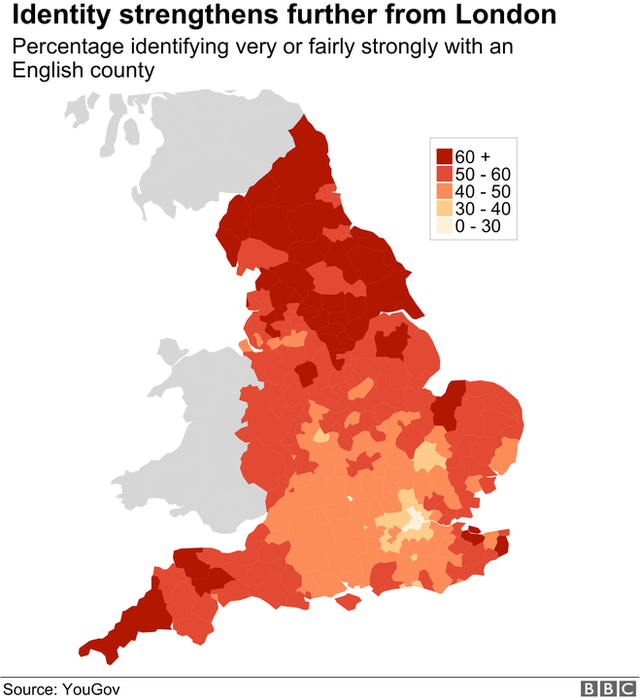
Is England past its best?
About half of the 20,081 people surveyed (49%) believe England's best years are over while one in six (17%) thought they were still to come.
The survey does not reveal at which point England apparently passed its best, but the results suggest:
Despite their pride in being English, the majority of over 65s (60%) believe England was better in the past
Two thirds of over 65s (67%) said England is better than most other countries in the world
Slightly more Remain voters (20%) than Leavers (15%) believe England's best years lie ahead
Young people are the most optimistic, with 28% of 18 to 24-year-olds believing England's best years are still in the future
55% of people aged 50-64 and 60% of people aged 65 and over say England was better in the past
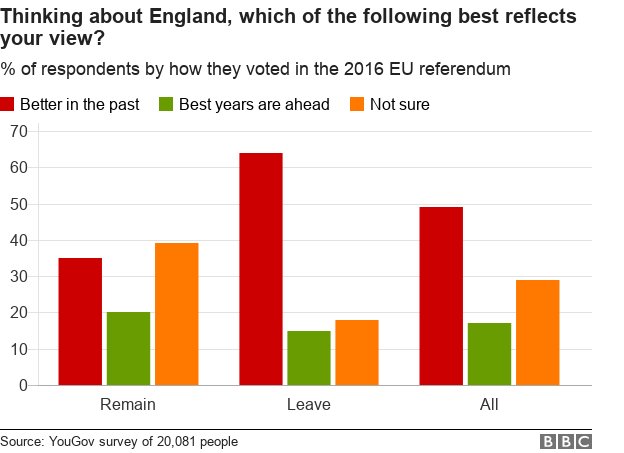
John Denham, director of the Centre for English Identity and Politics at the University of Winchester, said "pessimism" was not unique to one group or area of England.
The former Labour cabinet minister said he believed giving people a greater say over how they are governed would reduce the pessimism.
"Older people do tend to think things were better in the past but what's striking is that there isn't a demographic where the optimists outweigh the pessimists," said Mr Denham.
"This pessimism is not as universal in Wales and Scotland, where more people think the future will be better than the past, and where devolution has asked people what sort of nation they wanted to be in the 21st Century.
"England outside London has never had that. People have a sense that no-one is talking about the people outside the capital. In the EU referendum, the Leave campaign's slogan 'take back control' cut through for that reason."
Are people proud to be English?
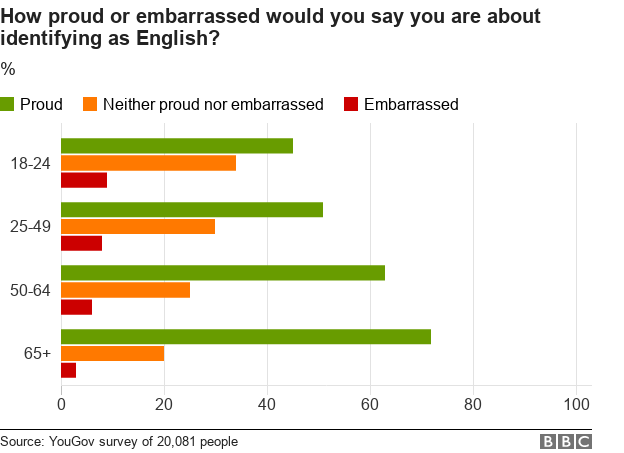
Nearly three quarters of over-65s are proud to be English compared with fewer than half of those aged 18 to 24.
Mr Denham said: "Young people will tend to be less patriotic than older people wherever they are, whether that's England, Scotland or Wales.
"They will have a more cosmopolitan view of the world. And in the younger generation there are more people from black and minority ethnic groups who are more likely to identify as British than as English.
"It doesn't mean that Englishness and English pride is disappearing, but we are looking at a future where both Britishness and Englishness will mean a lot to a lot of people."
What makes someone English?
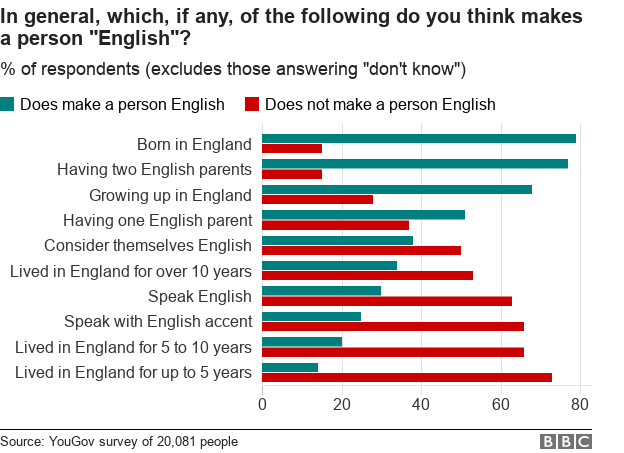
Being born in England makes someone English according to eight out of 10 people surveyed.
Living in England for less than five years qualifies someone as English in the minds of just 14% of those who responded.
For just over a third of people (38%) considering yourself English is enough and trumps even living in England for 10 or more years or even being able to speak English.
A sense of humour, tradition, manners and fair play are characteristics most people surveyed associate with being English.
Although more than half of respondents consider strongly that generosity and plain-speaking were part of the English identity, less than half think the English are a liberal, outward-looking people.
And less than four in 10 consider Englishness to be defined by "yob culture". Only one in four consider the English to be a "loud" people.
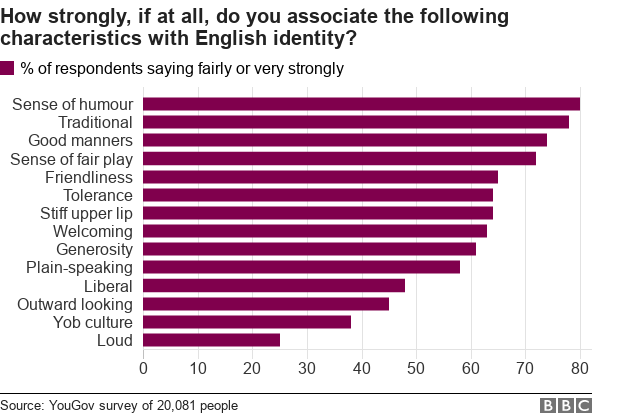
"So-called yob culture is not such a dominant image of Englishness as some people think," said Mr Denham.
"If you see footage of English football fans smashing up a town square, you're going to think about yob culture at the time, but most people associate Englishness with much more positive values most of the time.
"The stiff upper lip comes from stories of heroism but it's also about a cultural respect for qualities that people aspire to - of getting on with things and not making a fuss."
About the data
The opinion poll was conducted by YouGov who questioned 20,081 people. The poll has a margin of error of plus or minus 1%.
The council level estimates shown in the search box above are based on the poll and a statistical procedure called multilevel regression and post-stratification or MRP, external. The technique produces estimates for small areas based on a limited amount of data. It uses the people from each local authority to predict that area's results, but to ensure that this small amount of data is representative of the wider population the estimates are balanced out using comparable data from the poll from the rest of the country and the census on the demographic make-up of the local authority in question. As with all models the figures are subject to uncertainty. The analysis was run by Dr Kevin Cunningham working with Dr Ian Warren of @ElectionData. More details on MRP are available from YouGov, external.
- Published3 June 2018